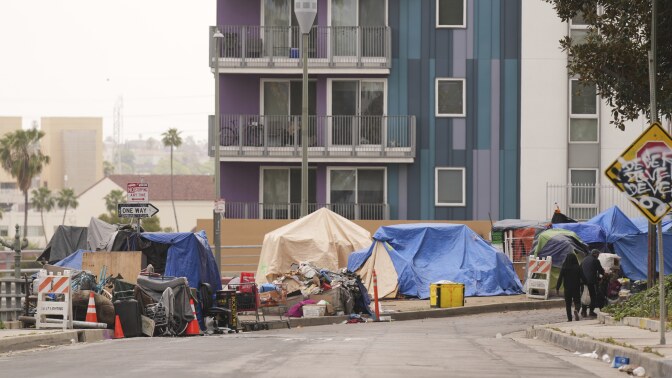This story is free to read because readers choose to support LAist. If you find value in independent local reporting, make a donation to power our newsroom today.
The Trump administration plans major shift away from long-term housing for homelessness

The Trump administration is upending its homelessness policy, with deep cuts to funding for long-term housing. Instead, it will shift money toward transitional housing that requires work and addiction treatment.
In a statement, the Department of Housing and Urban Development said the new policies will "restore accountability" and promote "self-sufficiency" by addressing the "root causes of homelessness, including illicit drugs and mental illness."
Critics warn the major overhaul could put 170,000 people at risk of losing their housing again. And they say the timing of this major overhaul is terrible. Normally, funding notices go out in August, but now programs around the country will have little time to start applying for new funding in January. And in many places, it will leave a months-long gap after current funding runs out and before new money flows.
In LA
Last fiscal year, the L.A. region received more than $220 million in federal funds from the HUD for housing and other services for unhoused people. Most of that funding — about $150 million — went toward permanent supportive housing.
In another change, HUD will no longer automatically renew existing programs — creating the possibility that formerly homeless people who've lived in subsidized housing for years will be forced out. The agency is also opening up more funding for faith-based groups.
The National Alliance to End Homelessness says the new policies could upend life for many people who've found stability in permanent housing programs. "HUD's new funding priorities slam the door on them, their providers, and their communities. Make no mistake: homelessness will only increase because of this reckless and irresponsible decision," CEO Ann Oliva said in a statement.
The funding shift reflects a conservative backlash to longstanding policies
For two decades, federal funding has prioritized getting people into permanent housing and then offering them treatment. That policy is called Housing First and has long had bipartisan support. Backers say the approach has a proven track record of keeping people off the streets.
But critics counter that it has failed to stem the steady rise of homelessness to what are now historic levels.
Those critics include President Donald Trump, who has long pushed cities to clear homeless encampments from streets and parks. The new funding shift reflects an executive order he signed in July, which also sought to make it easier to confine unhoused people in mental institutions against their will.
"The influence of Housing First just became too powerful," says Stephen Eide, a senior fellow at the Manhattan Institute, a conservative think-tank. He calls it a top-down approach, and says for years it was hard to get funding unless a program followed that policy. Eide says that left out a large group of people who may not need permanent housing or who may want the enforced sobriety it does not offer.
"I think what we're going to be looking for is a reinvestment in transitional housing," he says. That means places people can stay for 18 months or so to get sober or recover in other ways, and then — ideally — move out and succeed on their own.
There's broad agreement that the U.S. needs more of every kind of support for homeless people: permanent housing, rehab and mental illness treatment. But critics of HUD's shift fear this may make it harder for some to get help.
"It is moving away from trauma-informed care, and that's problematic," says Stephanie Klasky-Gamer, president and CEO of LA Family Housing in Los Angeles.
For example, she thinks this will lead more shelters to bar people unless they're already sober or enrolled in recovery or mental health care. But that's a high bar for many people, she says, and it could backfire.
Copyright 2025 NPR










